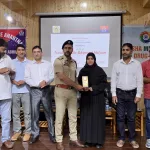Children need right food at the right time to grow and develop to their full potential. The most critical time for good nutrition is during the 1,000-day period from pregnancy until a child’s second birthday. To know more about childhood nutrition and its importance, Rising Kashmir’s Health Correspondent M Peerzada, is in conversation with Dr Suhail Naik, Consultant Paediatrician Department of Paediatrics, Children Hospital Srinagar, who talks about the importance of childhood nutrition, intervention for mental development of children.
What is early childhood nutrition?
The overall human health is determined by the proper nutrition and diet consumed by children as we can’t synthesis our food like plants. Right from the birth, newborn is highly dependent on external sources for nutrition required for growth and development.
According to the National Guidelines on Infant and Young Child Feeding (IYCF), every infant should be exclusively breastfed for the first six months of life. Breastfeeding is utmost important to achieve optimal growth, development, and health.
Major physical growth of brain occurs in the first 6 months of infant life and breast milk is the best nutrition for brain growth. Brain growth is very important as its size and integrity determines the development potential of children like a ram in computer hardware.
By six months of age parents must start complementary feeding by traditionally available foods. We have often observed that parents are confused about complementary feeding, and they don’t know when to start? What to start and much to give? What should be consistency or frequency of feeds?
Parents must know that around the age of 6 months, an infant’s need for energy and nutrients exceeds what is provided by breast milk and complementary foods are necessary to meet those energy gaps. An infant of this age is also developmentally ready for other foods. If complementary foods are not introduced around the age of 6 months, or if they are given inappropriately, an infant’s growth may falter, and he becomes fussy food eater later.
The parents should adopt responsive feeding. Feed slowly and patiently and take lot of time to feed an infant, encourage them to eat but do not force them, talk to the child and maintain eye contact.
How can parents prevent malnutrition in infants and young children?
Parents must be counseled about infant and young child feeding. Antenatal counseling to promote breastfeeding should be part of maternal and childcare services. It is moral, ethical, social, and religious responsibility of treating gynecologists to educate mother about advantages of breastfeeding and prepare her psychologically during pregnancy.
Liberal complementary feeding should be started at 6 months to meet evolving nutritional requirements. Infants should receive nutritionally adequate, energy dense and safe complementary foods while breastfeeding continues for up to two years of age or beyond.
How important is breastfeeding to save lives in first two years of life?
Exclusive breastfeeding for 6 months has many benefits for the infant and mother. Chief among these is protection against gastrointestinal infections which is observed not only in developing but also industrialized countries.
Early initiation of breastfeeding, within 1 hour of birth, protects the newborn from acquiring infections and reduces newborn mortality. The risk of mortality due to diarrhea and other infections can increase in infants who are either partially breastfed or not breastfed at all.
Children and adolescents who were breastfed well are less likely to be overweight or obese. They perform better on intelligence tests and have higher school attendance.
Poor diet in early childhood can lead to deficiencies in essential vitamins and nutrients. How can it affect children?
It is estimated that many infants and children don’t receive optimal or proper status of families. For example, only about 44 percent of infants aged 0–6 months worldwide were exclusively breastfed over the period of 2015-2020.
Under nutrition is estimated to be associated with 2.7 million child deaths annually or 45 percent of all child deaths. Infant and young child feeding is a key area to improve child survival and promote healthy growth and development.
Around the age of 6 months, an infant’s requirement for energy and nutrients starts increasing and energy gap develops that can’t be fulfilled by breast milk. Feed slowly and patiently, encourage them to eat but don’t force them, talk to the child, and maintain eye contact, practice good hygiene and proper food handling.
Parents should gradually increase food consistency, variety and frequency from 2–3 meals per day for infants 6–8 months of age and 3–4 meals per day for infants 9–23 months of age, with 1–2 additional snacks as required to meet energy needs.
How can we prevent iron-deficiency anemia?
Its main reason is faulty feeding practices, incorporating tradition and rituals in feeding practices and lack of awareness about iron supplementation national programs. Iron deficiency anemia is very common among Indian children affecting around 80 percent population. Iron deficiency starts from womb and continues till tomb.
Iron deficiency is the most common nutritional deficiency in the world. Globally, an estimated 47 percent (293 million) of all preschool-aged children and 42 percent (56 million) of all pregnant women are anemic, with approximately half attributable to iron deficiency. These processes in turn support the speed of processing in the brain, as well as behaviours such as affect and emotion, and learning and memory.
What are first 1,000 days of life?
The first two years of life including nine months in uterus are the first 1,000 days of life that is nine months plus first two years of life. There is universal consensus that this period is important for optimal brain development of child what is known as early child development.
The first 1,000 days of life, the time spanning roughly between conception and one’s second birthday, is a unique period of opportunity when the foundations of optimum health, growth and neurodevelopment across the lifespan are established.
Yet too frequently in developing countries, poverty and its attendant condition, malnutrition, weaken this foundation, leading to earlier mortality and significant morbidities such as poor health, and more insidiously, substantial loss of neurodevelopmental potential.
As a species, we have come from a history of malnutrition being synonymous with undernutrition the serious lack of obtaining even adequate amounts of nutrition. In the modern era, while undernutrition remains the major challenge worldwide, we humans are now faced with the negative effects of overnutrition in the form of obesity and risky nutrition in the form of unbalanced diets or diets contaminated with potential toxins. Each of these conditions can be considered malnutrition in the true sense of the word’s roots (bad nutrition) and each has been shown to potentially reduce brain development.
Don’t you think the first 1,000 days is a sensitive period for development?
Absolutely yes, while the human brain continues to develop and change throughout life, the most rapid period of brain growth and its period of highest plasticity is in the last trimester of pregnancy and the first two years of life.
The human brain at 5 months post-conception is a smooth, bi-lobed structure that looks somewhat like a coffee bean. By 9 months, i.e. term birth, it has gyri and sulci indicative of significant complexity, looking far more like the walnut-like adult brain.
At birth, rapidly developing brain areas include the hippocampus and the visual and auditory cortices. In the first postnatal year, there is rapid growth of the language processing areas as well as early development of the prefrontal cortex that will control higher processing such as attention, inhibition, and flexibility.
The first 1,000 days are characterized by rapid rates of neuronal proliferation (cell numbers), growth and differentiation (complexity), myelination, and synaptogenesis (connectivity). Thus, this time period harbors the greatest opportunity to provide optimal nutrition to ensure normal development and also the time of greatest brain vulnerability to any nutrient deficit.
What measures will you suggest for optimal development from 0-5 years?
While all nutrients are important for brain development and function, optimal overall brain development depends on providing enough key nutrients during specific sensitive time periods in these first 1,000 days.
The brain is not a homogenous organ, but instead consists of multiple separate regions, each with a unique growth trajectory, that ultimately interconnect to make the complex organ that drives behavior.
Thus, there is not a single common growth trajectory or single sensitive period. Rather, the different regions (e.g., the hippocampus, striatum, cortex) and processes (e.g., myelination) of the brain exhibit growth trajectories that span and peak at different times, each period (and region) having specific nutrient requirements.
A critical nutrient at one period may have little or no effect in another epoch. Identification of these periods is typically made first in animal models and confirmed with nutritional supplementation studies in pregnancy or early infancy that yield beneficial cognitive and behavioural outcomes.
What is the role of nutrients?
Receiving good nutrition in the womb and through early life is essential for a child’s future health. Research has shown that what a mother eats, her weight and her lifestyle habits can influence how the baby’s metabolism, immune system and organs develop. Poor nutrition during pregnancy and early life can lead to obesity, heart disease and stroke later.
What nutrients are essential for baby’s brain during pregnancy?
Nutrients such as folic acid, iron, zinc, and iodine, as well as protein and fatty acids play a vital role in building a baby’s brain during pregnancy. When one or more of these is absent during pregnancy, a baby could be at risk for developmental delays, birth defects and cognitive deficits. Because a mother’s diet, nutrient stores are only source of nutrition for a developing baby, and it is critical that women get health care and nutritious food they need before and during pregnancy.
Does stress affect baby’s development?
Stress endangers young children’s brain development. Persistent stress sometimes called toxic stress can interfere with formation of connections and networks that support thinking and learning. In extreme cases, it can result in permanent changes in the brain’s size and structure.
Babies are affected by stress even in the protective environment of the womb. A mother’s level of stress during pregnancy influences her baby’s risk of premature birth, low birth weight, and other complications.





